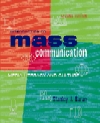|
 |  Introduction to Mass Communication, 2/e Stanley J. Baran
Letter From the Author| Dear Mass Communication student,
The edition of Introduction to Mass Communication: Media Literacy and Culture that you are now reading was written during a prosperous time for our nation, when American media industries were undergoing rapid and unprecedented change. American companies of all kinds were expanding their operations and markets around the world. Dot-com companies were thriving in a "New Economy" that many thought likely to prosper for decades. New media technology was evolving so rapidly and new media applications were proliferating so fast that a new scale of "Internet time" was created to measure change. "Brick and mortar" companies were dissolved in favor of virtual enterprises. Media theory and research was also changing. Theory was in ferment as new perspectives challenged long-standing notions. Researchers (and teachers and students) struggled with questions resulting from the changes in media. They debated how best to understand the role of new media and chart its place among the well-established "traditional" media. Considerable research focused on mass media entertainment and its effects. Researchers asked whether new media-based entertainment would displace established mass media. MP3? Web radio? Digital films delivered by satellite to cinemas? Would the Internet displace television or would television absorb the Internet? Would people pay the extra price to get HDTV? On September 11, 2001 everything changed.
The Western world is now reeling from the terrorist attack on the World Trade Center in New York. Our country is involved in a new type of war, a war not against an enemy country, but against terrorism. Americans are asked to make important sacrifices and to be vigilant, but at the same time to carry on with our daily lives as though September 11 had never happened. Therefore, we face a serious challenge. When it comes to understanding mass communication, what is still relevant and what has been rendered unimportant? How best can we understand the role that the media now plays in a world that has been radically altered?
On September 11 we were eyewitnesses to an atrocity that will forever alter our experiences in the social world. The power of media to mediate an event and bring it into our homes was never before demonstrated so dramatically. But how should we understand this power? Is it something we should embrace or fear? Is it a new form of media power or has it been seen before? In the weeks following the attack, our nation was swept by a wave of patriotism the likes of which had not been seen since the Second World War. Support for government and the President rose to new heights. Did media play a role in fostering this transformation of public opinion? In a time of national crisis, what role can and should media play?
Your teachers will no doubt raise many of these "9/11" mass communication questions with you. But don't wait for them. You are citizens of the world; you are consumers and users of the mass media. It may be a trite expression by the time you read this, but the world has changed…forever. As such, the world of mass communication has changed…forever. Were you surprised by the attacks? By the degree of anti-American sentiment around the world? Were you impressed by media coverage of 9/11? Disappointed by media's capitulation to the government and military once the war in Afghanistan began? There has never been a time when the centrality of mass communication to our lives, and to our self-governance, was more obvious. Therefore, there has never been a time in our lives when media literacy was more important.
These are troubling times. Passions run high. "Arab-looking" people here at home are attacked. Efforts to understand what has and is happening are challenged as "un-American." Objection to our nation's response to 9/11 are called "treasonous." But this is America. This is your America. It is what you make it. After all, isn't that what it means to be a democracy? And as you know, democracy means government of, by, and for the people. How do we govern ourselves? How do we know what we want and what we want to do? How do we know what is working and what is not? We know these things through our use of the mass media. If we use them poorly, we govern ourselves poorly. If we use them well, we govern ourselves well.
I wish you well in these tough times, Stanley Baran
|
|
|



 2002 McGraw-Hill Higher Education
2002 McGraw-Hill Higher Education

 2002 McGraw-Hill Higher Education
2002 McGraw-Hill Higher Education